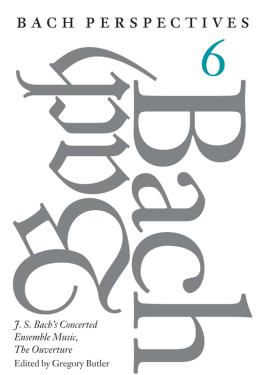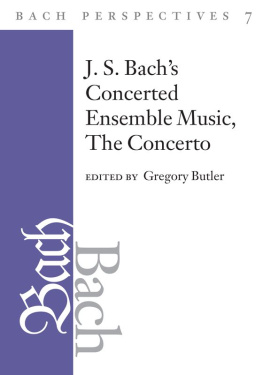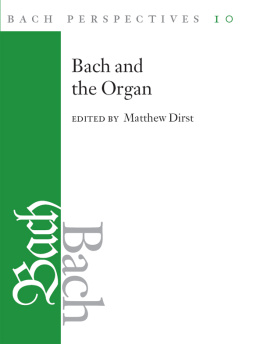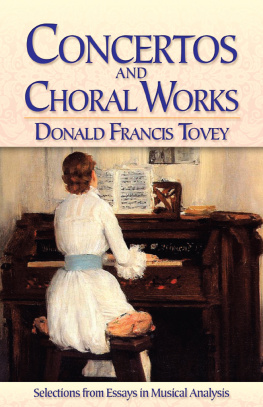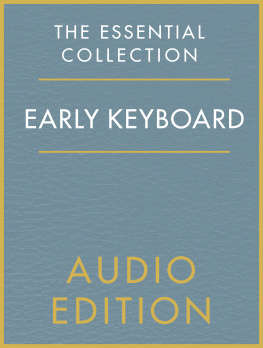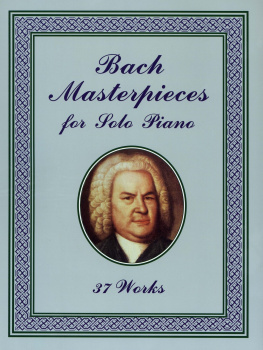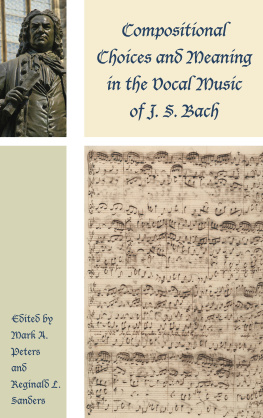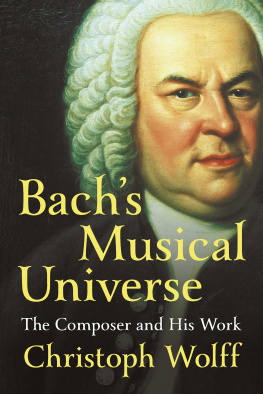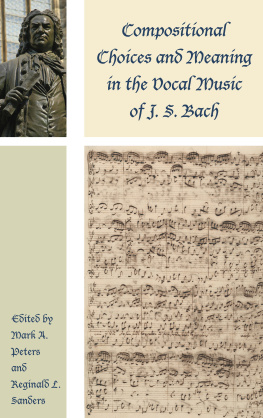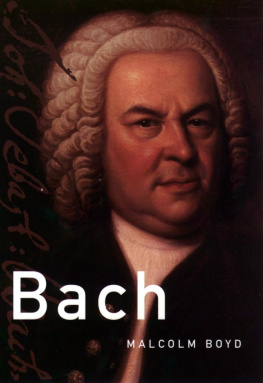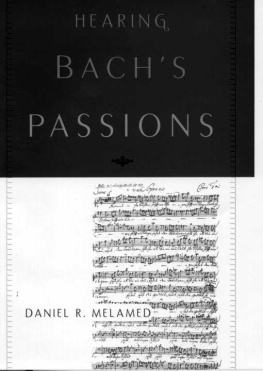BACH PERSPECTIVES
VOLUME SIX
J. S. Bachs Concerted Ensemble Music,
The Ouverture
BACH PERSPECTIVES
VOLUME SIX
Editorial Board
Gregory G. Butler, University of British Columbia
Don O. Franklin, University of Pittsburgh
Walter B. Hewlett, Center for Computer-Assisted Research in the Humanities
Robert A. Leaver, Westminster Choir College of Rider University
Michael Marissen, Swarthmore College
Daniel R. Melamed, Indiana University
George B. Stauffer, Mason Gross School of the Arts, Rutgers University
Russell Stinson, Lyon University
Christoph Wolff, Harvard University
Bach
Perspectives
VOLUME SIX
J. S. Bachs Concerted Ensemble Music,
The Ouverture
Edited by Gregory G. Butler
UNIVERSITY OF ILLINOIS PRESS URBANA AND CHICAGO
2007 by the Board of Trustees
of the University of Illinois
All rights reserved
ISSN 1072-1924
ISBN 0-252-03042-7
Bach Perspectives is
sponsored by the
American Bach Society
and produced under the
guidance of its Editorial
Board. For information
about the American Bach
Society, please see its
Web site at this URL:
www.americanbachsociety.org
CONTENTS
BY JOSHUA RIFKIN
BY JEANNE SWACK
BY STEVEN ZOHN
PREFACE
T his series, Bach Perspectives, was begun in 1995 as a forum for exploring various facets of the life and works of the composer Johann Sebastian Bach. Three volumes are devoted to studies of the reception of Bachs music in subsequent generations. Contributions in BP 2 focus on the Leipzig publishing house of Breitkopf and the dissemination of Bachs music in the eighteenth century; those of BP 3 trace the impact of Bachs creativity on the compositional activity of composers from Mozart to Hindemith; and essays in BP 5 collectively explore many facets of Bach reception in America, from Dwights Journal to Brubecks jazz. Other volumes deal more directly with Bachs music.
In BP 1 the authors investigate compositional issues, such as the role of improvisation in the keyboard works, and address cyclic structures and parody in cantatas, and concerto styles in instrumental works. In BP 4 the studies center on analysis and interpretation regarding specific forms and styles of a wide range of Bachs music. In this and the following volume ( Bach Perspectives 6 and 7), concerted ensemble music by Bach takes center stage, and in many respects this topic further develops the issues raised in both BP 1 and BP 4.
Many of the works discussed in these two volumes would have been heard in Zimmermanns coffee house or garden, as part of performances of the Leipzig Collegium Musicum directed by Bach. Heinrich Zedlers Grosses Universal Lexicon included the following entry in 1739:
Musicum collegium is a gathering of certain musical connoisseurs who, for the benefit of their own exercise in both vocal and instrumental music and under the guidance of a certain director, get together on particular days and in particular locations and perform musical pieces. Such collegia are to be found in various places. In Leipzig, the Bachian Collegium musicum is more famous than all others.
The fame of the Leipzig Collegium Musicum was not simply due to the technical proficiency and musicianship of its members but also, and in large measure, arose from the superlative and ingenious creativity of its director, Johann Sebastian Bach, whose music they performed. Such works continue to be appreciated and applauded, and the studies presented in BP 6 and BP 7 investigate their respective origins, characteristics, forms, and significance.
Robin A. Leaver, past President
The American Bach Society
EDITORS PREFACE
T his volume of Bach Perspectives, along with its sister volume, to be published next in the series, marks the extension of a project begun with my early collaboration on volume 4 of the series, edited by David Schulenberg and published in 1999. The intention to bring out a collection of essays devoted entirely to Bachs concerted ensemble music, only partly realized in two studies by Jeanne Swack and myself in the earlier volume, has now come to fruition in volumes 6 and 7. The first of these focuses on the ouverture, a genre of concerted ensemble music that has received remarkably little attention in the scholarly literature of late.
The opening essay by Joshua Rifkin is a seminal study of the early source history of the B-minor orchestral suite BWV 1067. It not only elaborates on his discovery that the work in its present form for solo flute goes back to an earlier version in A minor, ostensibly for solo violin, but also takes this discovery as the point of departure for a wide-ranging discussion of the origins and extent of Bachs concerted ensemble music. The other two studies in the present volume mark a continuation of the focus of the two earlier studies in volume 4, referred to abovethat of genre. Jeanne Swack presents an enlightening comparison of Georg Phillip Telemanns and Bachs approach to the overture as concerted movements in their church cantatas, highlighting the somewhat idiosyncratic approach of the former. Finally, Steven Zohn views the ouverture BWV 1067 from the fascinating generic standpoint of the concert en ouverture.
This volume is innovative in at least one respect. Zohns study acts as a response to Rifkins in suggesting that the early version of the B-minor suite may also have been scored for flute. Thus Bach Perspectives 6 continues not only to present issues at the heart of Bach studies, but also to reflect the atmosphere of healthy scholarly debate that informs and animates the field.
Gregory Butler
Vancouver, British Columbia
ABBREVIATIONS
BDOK Werner Neumann and Hans-Joachim Schulze, eds. Bach-Dokumente. 4 vols. Kassel: Brenreiter; Leipzig: VEB Deutscher Verlag fr Musik, 196378.
BG [Bach-Gesamtausgabe.] Johann Sebastian Bachs Werke. Edited by the Bachgesellschaft. 47 vols. Leipzig: Breitkopf & Hrtel, 185199.
BJ Bach-Jahrbuch.
BOM Siegbert Rampe and Dominik Sackmann. Bachs Orchestermusik: Entstehung, Klangwelt, Interpretation. Kassel: Brenreiter, 2000.
BOW Bachs Orchesterwerke, ed. Martin Geck and Werner Breig. Dortmunder Bach-Forschungen 1. Witten: Klangfarben-Verlag, 1997.
BWV [Bach-Werke-Verzeichnis.] Wolfgang Schmieder, ed. Thematisch-systematisches Verzeichnis der musikalischen Werke von Johann Sebastian Bach. Rev. ed. Wiesbaden: Breitkopf & Hrtel, 1990.
KB Kritischer Bericht (critical report) of the NBA .
NBA [Neue-Bach-Ausgabe.] Johann Sebastian Bach: Neue Ausgabe smtlicher Werke. Edited by the Johann-Sebastian-Bach-Institut, Gttingen, and the Bach-Archiv, Leipzig. Kassel: Brenreiter; Leipzig: Deutscher Verlag fr Musik, 1954.
NBR Hans T. David and Arthur Mendel, eds. The New Bach Reader: A Life of Johann Sebastian Bach in Letters and Documents. Revised and enlarged by Christoph Wolff. New York: W. W. Norton & Co., 1998.
P Berlin, Staatsbibliothek zu Berlin, Mus. ms. Bach P (Partitur).
ST Berlin, Staatsbibliothek zu Berlin, Mus. ms. Bach St (Stimmen).
TVWV [Telemann-Vokalwerke-Verzeichnis.] Werner Menke, ed. Thematisches Verzeichnis der Vokalwerke von Georg Philipp Telemann. 2 vols. Frankfurt am Main: Klosterman, 198183.
TWV [Telemann-Werke-Verzeichnis.] Martin Ruhnke, ed. Georg Philipp Telemann: Thematisch-Systematisches Verzeichnis seiner Werke: Instrumentalwerke. 3 vols. Kassel: Brenreiter, 1984.
The B-Minor Flute Suite Deconstructed
New Light on Bachs Ouverture BWV 1067

